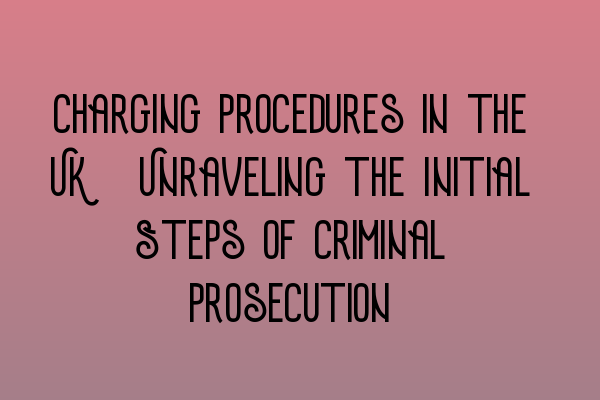Charging Procedures in the UK: Unraveling the Initial Steps of Criminal Prosecution
When a crime is committed in the UK, the charging procedures are set in motion to initiate the process of criminal prosecution. Understanding the foundation of these procedures is crucial to comprehend the legal journey that follows. In this article, we will delve into the initial steps of criminal prosecution and shed light on the important aspects of charging procedures in the UK.
1. Arrest and Detention
The first step in the charging process is the arrest and detention of the suspect. When the police have reasonable grounds to believe that an individual has committed a crime, they can arrest the person. This may involve taking the suspect to the police station for further investigation and questioning. If sufficient evidence is found, the suspect may be charged with the crime.
Are you preparing for your SQE 1 Practice Exam Questions? Make sure to understand the charging procedures as they are commonly tested topics. Familiarity with the legal aspects of criminal prosecution is essential for success in the examination.
2. Police Investigation
Once a suspect is arrested, the police initiate an investigation to gather evidence and build a case against the accused. This involves conducting interviews, gathering witness statements, collecting physical evidence, and analyzing any relevant data or documents. The police investigation plays a vital role in determining whether there is enough evidence to proceed with formal charges.
If you are looking to enhance your knowledge in criminal law, consider enrolling in SQE 2 Preparation Courses that cover various aspects of criminal prosecution. These courses can provide you with the necessary skills and understanding to excel in the field.
3. Charging Decision
After the completion of the police investigation, the Crown Prosecution Service (CPS) is responsible for making the charging decision. The CPS carefully reviews the evidence gathered by the police and determines whether it is sufficient to support a realistic prospect of conviction. If the evidence meets this threshold, the CPS proceeds with formal charges.
If you are planning to pursue a career in criminal law, it is crucial to have a solid understanding of the charging decision process. This knowledge can be acquired through comprehensive SQE 1 Preparation Courses that cover all the important aspects of criminal procedure and prosecution.
4. Court Proceedings
Once formal charges are filed, the case moves to the court proceedings stage. The accused appears before a judge and has the opportunity to enter a plea, either guilty or not guilty. The court considers the evidence presented by both the prosecution and defense, and it is responsible for determining the outcome of the case.
If you are interested in staying updated on the latest legal developments and SRA SQE exam dates, check out our article on SRA SQE Exam Dates. It provides valuable information about the upcoming exams, enabling you to plan your preparation effectively.
Conclusion
Understanding the charging procedures in the UK is crucial for anyone involved in criminal law. From arrest and detention to court proceedings, each step of the process plays a significant role in determining the outcome of a criminal case. By familiarizing yourself with these initial steps of criminal prosecution, you can navigate the legal landscape with confidence and expertise.
Are you ready to test your knowledge of criminal law and procedure? Try our SQE 1 Practice Mocks FLK1 FLK2 to assess your understanding and identify areas for improvement. Remember, preparation is key to success in the world of criminal law.
